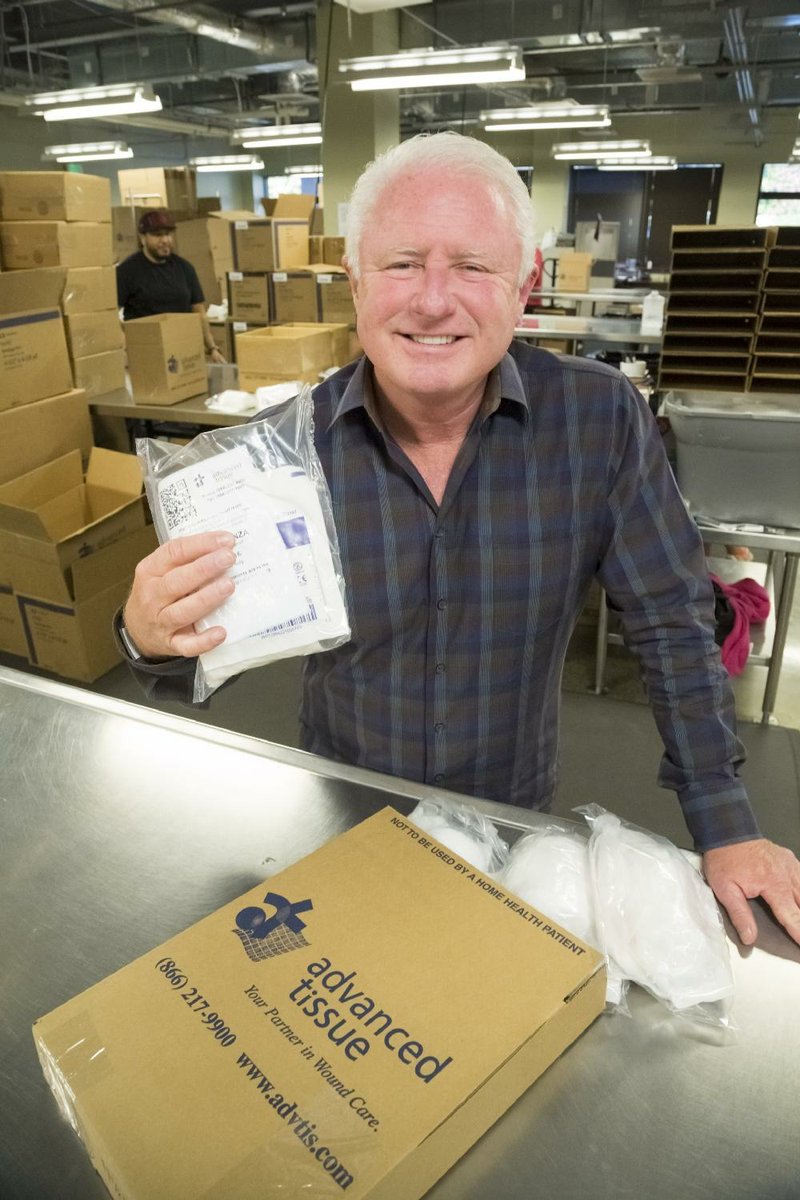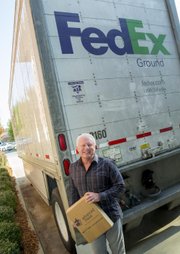Kevin Lamb built Little Rock-based Advanced Tissue in 2000 into a company that now ships 200,000 single-treatment packets a month to treat long-term wounds.
"Wound care is all we do, and most of our patients are diabetics," Lamb, chief executive officer of Advanced Tissue, said in a recent interview at the firm's three-story building in west Little Rock.
The packets include everything needed for one dressing change for a patient. They include advanced wound-care supplies and items such as wraps, gauze and tape.
Lamb expects the number of packet shipments to increase by 50 percent next year to 300,000 or more. One reason is the addition of quick response, or QR, code technology in the packages.
Starting in June, the code directed patients to videos on general nutrition and hygiene information. Beginning this month, the code also directs patients to videos on how to use their wound-care treatments. The single-treatment packets, which began when Advanced Tissue was formed, are shipped to patients across the country by FedEx.
The tutorials are specifically for the patient who receives the packet, Lamb said. Advanced Tissue has an inventory of 700 products and a tutorial lesson for every category of products.
"That patient-level training is something unique in our space," Lamb said. "The No. 1 reason patients don't get better in wound care is because they don't do what the doctor says. Usually that's based on confusion and frustration. In wound care, it's all about patients following directions."
Wounds that took eight months to heal when Lamb got into the business now heal in about three months.
"That's because the doctors are better at this, their training has improved, products are improved and companies like us make sure patients get what they need," Lamb said.
Dr. John Kirby, a surgeon at Barnes-Jewish Wound Center in St. Louis, has used Advanced Care for more than five years to supply his patients.
Most people with long-term wounds "are not healthy people to start off with," Kirby said.
"We've found that working with Advanced Tissue has been mutually productive," Kirby said. "You'd be amazed at the number of different wound-care dressings, supplies, ointments and salves that are now available in the marketplace. And yet it is occasionally problematic for patients who have difficult wounds to get appropriate supplies."
Many items recommended by physicians might not be stocked at a local drugstore, Kirby said.
"So having a company that fills the niche where the patients can have their supplies delivered is really very helpful," Kirby said. "And I've found that interacting with the company is very helpful for the patients I treat."
FedEx parks a truck at Advanced Tissue's building and the truck is filled daily.
The company doesn't outsource anything, including computer programming, hardware support and even the film crew that produces the videos, Lamb said.
Lamb decided to create the videos in-house because he has a business that produces full-length feature films.
Lamb estimated that Advanced Tissue does about $35 million to $45 million a year in revenue and has 110 employees.
The company has about 35 sales representatives who cover the country.
"I think we're the largest [company] at specifically wound care, but most of our competitors have other add-on products," Lamb said. "And I don't know what their revenue is."
With all the extra services Advanced Tissue offers -- such as supplying single packages with everything needed to treat wounds -- the company still charges patients the same as its competitors. Lamb admitted the strategy reduces profits.
"We think our market share will way outpace what it does to our profitability," Lamb said. "We're taking a gamble. We're hoping the plan we have in place will encourage more people to use our service."
Advanced Tissue is unique in providing single-treatment packets, Kirby said.
"Advanced Tissue does a very good job being a competitive, fair-market broker-advocate on behalf of patients," Kirby said. "In general I think the patients do better when they have a coordinated way of getting their supplies. We like to think that a more attentive and compliant patient is less likely to have problems getting their wounds healed."
Lamb has been in some type of specialty niche medical business for years, such as his involvement in a pain management business in the 1990s.
"We were looking at buying a wound-care product when we recognized that people were getting into this business to provide wound-care dressings for patients and [that] doctors were beginning to start clinics that were wound-care clinics," Lamb said. "And it was all being driven by diabetes."
Patients with diabetic foot ulcers can face serious problems quickly, Lamb said.
So Lamb and his wife, Sharon, started Advanced Tissue with only three employees in a 1,000 square-foot space in a west Little Rock strip shopping center. Advanced Tissue was only the third company in the country providing wound care for diabetics.
"At the time, the market was way underserved," Lamb said.
Because of changes in the way health insurance paid for wound-care treatments, doctors couldn't afford to keep providing products to patients to treat their wounds because they couldn't bill for the products, Lamb said.
Doctors at the time wrote prescriptions for patients to pick up at a pharmacy, but the patients often couldn't find all the products at the pharmacy. The elderly in particular were confused about how to use them.
"What we bill has been in existence since 1977," Lamb said. "It wasn't something new and improved. We identified that the patients needed to get supplies and they couldn't get them at the local pharmacy. They had to get it from medical supply companies like ours."
Advanced Tissue is working with the American Diabetes Association to produce videos that will come out early next year to provide patients information about their health care, diets and how to prepare the proper meals, Lamb said.
"We want to teach people how to live with diabetes," Lamb said.
SundayMonday Business on 10/30/2016

